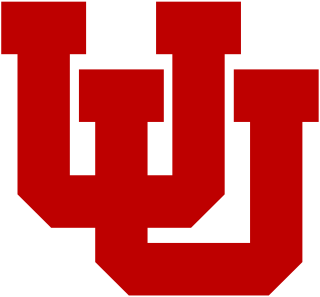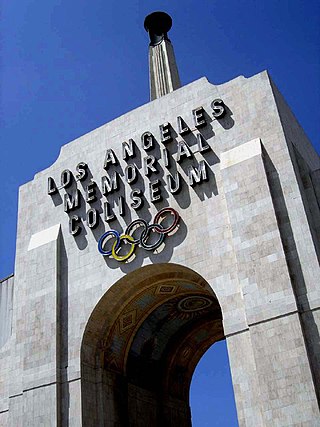Related Research Articles

The Bowl Championship Series (BCS) was a selection system that created four or five bowl game match-ups involving eight or ten of the top ranked teams in the NCAA Division I Football Bowl Subdivision (FBS) of American college football, including an opportunity for the top two teams to compete in the BCS National Championship Game. The system was in place for the 1998 through 2013 seasons and in 2014 was replaced by the College Football Playoff.

The Big Eight Conference was a National Collegiate Athletic Association (NCAA)-affiliated Division I-A college athletic association that sponsored football. It was formed in January 1907 as the Missouri Valley Intercollegiate Athletic Association (MVIAA) by its charter member schools: the University of Kansas, University of Missouri, University of Nebraska, and Washington University in St. Louis. Additionally, the University of Iowa was an original member of the MVIAA, while maintaining joint membership in the Western Conference.
The National Hockey League (NHL) Conference Finals are the Eastern Conference and Western Conference championship series of the NHL. The conference finals are each a best-of-seven series, and comprise the third round of the Stanley Cup playoffs. The two series are played in mid-to-late May. The winners of the Eastern and Western Conference finals receive the Prince of Wales Trophy and Clarence S. Campbell Bowl, respectively, and advance to face each other in the Stanley Cup Finals.

The Texas Longhorns are the athletic teams representing the University of Texas at Austin. The teams are sometimes referred to as the Horns and take their name from Longhorn cattle that were an important part of the development of Texas, and are now the official "large animal" of the state of Texas. Generally, both the men's and women's teams are referred to as the Longhorns, and the mascot is a Texas Longhorn steer named Bevo. The Longhorns have consistently been ranked as the biggest brand in collegiate athletics, in both department size and breadth of appeal.

The Arizona Wildcats are the athletic teams that represent the University of Arizona, located in Tucson. The Wildcats compete at the National Collegiate Athletic Association (NCAA) Division I level as a member of the Pac-12 Conference. Arizona's chief intercollegiate rival is the Arizona State Sun Devils, and the two universities' athletic departments compete against each other in multiple sports via the State Farm Territorial Cup Series.

The Utah Utes are the intercollegiate athletics teams that represent the University of Utah, located in Salt Lake City. The athletic department is named after the Ute tribe of Native Americans. The men's basketball team is known as the Runnin' Utes; the women's gymnastics team is known as the Red Rocks

Larry Dean Smith was an American football player and coach. He served as the head football coach at Tulane University (1976–1979), the University of Arizona (1980–1986), the University of Southern California (1987–1992), and the University of Missouri (1994–2000).

The San Diego State Aztecs are the intercollegiate athletic teams that represent San Diego State University (SDSU). San Diego State sponsors six men's and eleven women's sports at the varsity level.

The Greater Los Angeles area is home to many professional and collegiate sports teams and has hosted many national and international sporting events. The metropolitan area has twelve major league professional teams: the Los Angeles Lakers, the Los Angeles Dodgers, the Los Angeles Rams, the Los Angeles Clippers, the Los Angeles Angels, LA Galaxy, Los Angeles FC, the Los Angeles Kings, the Los Angeles Chargers, Los Angeles Sparks, the Anaheim Ducks, the Los Angeles Knight Riders of the MLC Major League Cricket, their Minor League Cricket affiliate SoCal Lashings, and Angel City FC of the National Women's Soccer League. The Los Angeles metropolitan area is home to nine universities whose teams compete in various NCAA Division I level sports, most notably the UCLA Bruins and USC Trojans. Between them, these Los Angeles area sports teams have won a combined 105 championship titles. Los Angeles area colleges have produced upwards of 200 national championship teams.
The Cal State Fullerton Titans football program represented California State University, Fullerton from the 1970 through 1992 seasons. The Titans originally competed as a member of the California Collegiate Athletic Association from 1970 to 1973 before moving to the Pacific Coast Athletic Association in 1974 where they remained through the 1991 season. The Titans would compete in their final year as an I-A Independent prior to the program being disbanded. Fullerton played its home games at multiple stadiums throughout their history with the most recent being Titan Stadium, in Fullerton, California.
The 1988 Freedom Bowl in Anaheim, California, pitted former Mountain States Conference rivals BYU and Colorado for the first time in a bowl game. It was only the second time the two teams met one another in football since the Buffaloes joined the Big Eight forty years earlier; the Buffaloes were favored in this bowl by three points.
The 1986 Freedom Bowl was a college football bowl game played on December 30, 1986. It was the third Freedom Bowl Game. The UCLA Bruins defeated the BYU Cougars 31–10. UCLA tailback Gaston Green was named the Player Of The Game. He ran for a record 266 yards, second only at the time to Curtis Dickey who ran for 276 in the 1978 Hall of Fame Classic. This is still the Pac-10 record for most rushing yards in a bowl game, and fourth highest in NCAA bowl history.

The 1989 Washington Huskies football team was an American football team that represented the University of Washington during the 1989 NCAA Division I-A football season. In its fifteenth season under head coach Don James, the team compiled an 8–4 record, finished in a three-way tie for second place in the Pacific-10 Conference, and outscored its opponents 332 to 225. Bern Brostek was selected as the team's most valuable player. Dennis Brown, Cary Conklin, Martin Harrison, and Andre Riley were the team captains.
The 1985 Freedom Bowl was a college football postseason bowl game played on December 30 in Anaheim, California. It matched the Washington Huskies of the Pacific-10 Conference and the Colorado Buffaloes of the Big Eight Conference.
The 1989 Freedom Bowl was a college football bowl game played on December 30 at Anaheim Stadium in Anaheim, California. The game featured the Washington Huskies of the Pacific-10 Conference and the Florida Gators of the Southeastern Conference, who were led by junior Emmitt Smith, a consensus All-American at running back.

For the 1984 Summer Olympics, a total of thirty-one venues were used. The Los Angeles Memorial Coliseum and the Rose Bowl, two venues previously used for the 1932 Summer Olympics, were used for the 1984 Games. Between the 1932 and the 1984 Summer Olympics, the expansion of professional sports teams assisted in the growth of the facilities that would be used for the 1984 events. Only two new permanent venues were constructed, both using corporate sponsorship, though neither were mentioned in the official Olympic report. Many other venues had temporary adjustments and returned to their normal usage once the 1984 Olympics were completed. Stanford Stadium in Palo Alto and the Rose Bowl later served as venues for the Super Bowl, the FIFA World Cup, and the FIFA Women's World Cup.
The 1984 Freedom Bowl was an American college football bowl game played on December 26, 1984, at Anaheim Stadium in Anaheim, CA. The inaugural edition of the Freedom Bowl matched the #19 Texas Longhorns of the Southwest Conference and the Big Ten's Iowa Hawkeyes. After leading 24–17 at halftime, the Hawkeyes blew the game open with 31 unanswered points in the third quarter to win 55–17.
The 1994 Freedom Bowl matched the Utah Utes and the Arizona Wildcats. This was the final Freedom Bowl game played.
The Lorimar Sports Network, or LSN, was an American ad hoc television network providing syndicated college football and basketball. It was based at Lorimar's original headquarters in Culver City, California, with an additional office in Dallas, Texas. It was in operation from 1983 until 1986.
The 1984 Big Ten Conference football season was the 89th season of college football played by the member schools of the Big Ten Conference and was a part of the 1984 NCAA Division I-A football season.
References
- ↑ Foldesy, Jody. "Bowls burgeon as big business", The Washington Times. December 21, 1997. Page A1.
- ↑ "1984 Freedom Bowl: Iowa 55, Texas 17". Archived from the original on 2006-12-09. Retrieved 2006-12-30.